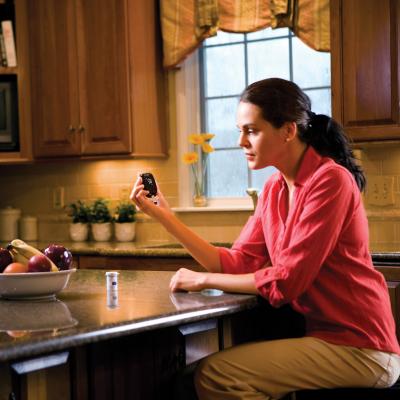4 Healthy Food Hacks For Busy Lives
While your calendar is filling up quickly and your to-do list seems never-ending, making sure the whole family is eating healthy and getting the nutrition they need is still possible. ...
Read MoreDiabetes Basics
Understanding the basics of diabetes is the first step in gaining control of your health. Let’s look at what causes diabetes, some of the common symptoms, the benefits of healthy living, and what to do if you’ve just been diagnosed. What is diabetes? Diabetes is a chronic disease. Your blood glucose levels are controlled by insulin, a hormone produced by your pancreas. When you eat, food gets broken down and glucose enters your bloodstream. Insulin takes the glucose out of your bloodstream and allows it to enter your cells where it is broken down and turned into energy. If you have diabetes, either you...
Read MoreHow to Talk to Your Healthcare Team
Whether you’ve been living with diabetes for years or you’re newly diagnosed, communicating with your healthcare team is one of the best things you can do. If you’re nervous about opening up to your doctor or pharmacist, there are some good reasons to conquer these fears. Less communication leads to measurable increases in your stress, anxiety, and possible depression. It also leads, inevitably, to less successful diabetes management.1 Since communicating with your healthcare providers is proven to be good for your health, here are some guidelines for starting the conversation and keeping it going. ...
Read MoreSelf-monitoring of your diabetes
Diabetes is part of your everyday life. Appropriate self-monitoring can help you manage your daily blood glucose, and better adapt your lifestyle and treatment to suit your needs.1 The more often you check your blood glucose, the better you will understand it and the easier it will be for you to manage your diabetes. It doesn’t matter if you have type 1 or type 2 diabetes, or if you are taking insulin or not, self-monitoring can help you and your doctor manage your therapy.2 By managing your diabetes, you reduce the risk of developing complications. That means less eye, kidney and nerve damage,...
Read MoreFine-tuning insulin pump therapy to match your lifestyle
Today’s insulin pumps have made considerable progress from when they were first made available. With settings for long, leisurely meals and bursts of physical activity, you can give your body the insulin you need when you need it. Think you're ready? Talk to your healthcare professional or diabetes specialist about putting these advanced features to work for you. Precise hourly basal rates. We talk about a continuous dose of insulin, but really, you can work with your healthcare professional and set your background dose to change throughout the day and night. For example, you can increase your early...
Read More4 good reasons to consider an insulin pump
Like many questions, to “pump or not to pump” has multiple correct answers. It’s an important tool in diabetes management and if you're thinking about making a switch to an insulin pump, we recommend discussing these points with your diabetes healthcare team. Blood glucose control. Because an insulin pump can more closely mimic the way a healthy pancreas delivers insulin, using an insulin pump can help to improve blood glucose control and reduce episodes of low blood glucose.1 With an insulin pump, insulin dosing can be more closely matched to activity and lifestyle needs throughout the day,...
Read More“Can do” resolutions for the new year
We all know what we should do. We know we should get 8 hours of sleep every night. We should regularly change the oil in our car. We should pay more attention to world events. However, knowing and doing are very different things. As we start a new year, it’s natural to ponder resolutions. Should you make them? Well, ideally. Will you keep them? Maybe not. If you’re setting goals or coming up with resolutions, consider the insights of some of our favorite diabetes online community members. Rather than thinking about what you should do, reframe and think about what you can do. Or what you want to do. Let...
Read MoreHearty Oatmeal
This is a tasty and satisfying oatmeal recipe! This recipe is portioned for a single serving, but can easily be tripled for a quick and easy breakfast throughout the week. Although it may sound unusual, the egg is the secret ingredient in this recipe. Adding an egg to your oats will pack it with protein and create a creamy consistency. Always consult your Health Care Professional to check if this recipe is right for you. Ingredients – Serves 1 • ¼ cup steel cut oats (not instant) • ¾ cup (180 mL) water • 1 egg • ½ cup blueberries • ½ cup strawberries...
Read MorePages
Diabetes Basics
Understanding the basics of diabetes is the first step in gaining control of your health. Let’s look at what causes diabetes, some of the common symptoms, the benefits of healthy living, and what to do if you’ve just been diagnosed. What is diabetes? Diabetes is a chronic disease. Your blood glucose levels are controlled by insulin, a hormone produced by your pancreas. When you eat, food gets broken down and glucose enters your bloodstream. Insulin takes the glucose out of your bloodstream and allows it to enter your cells where it is broken down and turned into energy. If you have diabetes, either you...
Read MoreHow to Talk to Your Healthcare Team
Whether you’ve been living with diabetes for years or you’re newly diagnosed, communicating with your healthcare team is one of the best things you can do. If you’re nervous about opening up to your doctor or pharmacist, there are some good reasons to conquer these fears. Less communication leads to measurable increases in your stress, anxiety, and possible depression. It also leads, inevitably, to less successful diabetes management.1 Since communicating with your healthcare providers is proven to be good for your health, here are some guidelines for starting the conversation and keeping it going. ...
Read MoreSelf-monitoring of your diabetes
Diabetes is part of your everyday life. Appropriate self-monitoring can help you manage your daily blood glucose, and better adapt your lifestyle and treatment to suit your needs.1 The more often you check your blood glucose, the better you will understand it and the easier it will be for you to manage your diabetes. It doesn’t matter if you have type 1 or type 2 diabetes, or if you are taking insulin or not, self-monitoring can help you and your doctor manage your therapy.2 By managing your diabetes, you reduce the risk of developing complications. That means less eye, kidney and nerve damage,...
Read MoreFine-tuning insulin pump therapy to match your lifestyle
Today’s insulin pumps have made considerable progress from when they were first made available. With settings for long, leisurely meals and bursts of physical activity, you can give your body the insulin you need when you need it. Think you're ready? Talk to your healthcare professional or diabetes specialist about putting these advanced features to work for you. Precise hourly basal rates. We talk about a continuous dose of insulin, but really, you can work with your healthcare professional and set your background dose to change throughout the day and night. For example, you can increase your early...
Read More4 good reasons to consider an insulin pump
Like many questions, to “pump or not to pump” has multiple correct answers. It’s an important tool in diabetes management and if you're thinking about making a switch to an insulin pump, we recommend discussing these points with your diabetes healthcare team. Blood glucose control. Because an insulin pump can more closely mimic the way a healthy pancreas delivers insulin, using an insulin pump can help to improve blood glucose control and reduce episodes of low blood glucose.1 With an insulin pump, insulin dosing can be more closely matched to activity and lifestyle needs throughout the day,...
Read More“Can do” resolutions for the new year
We all know what we should do. We know we should get 8 hours of sleep every night. We should regularly change the oil in our car. We should pay more attention to world events. However, knowing and doing are very different things. As we start a new year, it’s natural to ponder resolutions. Should you make them? Well, ideally. Will you keep them? Maybe not. If you’re setting goals or coming up with resolutions, consider the insights of some of our favorite diabetes online community members. Rather than thinking about what you should do, reframe and think about what you can do. Or what you want to do. Let...
Read MoreHearty Oatmeal
This is a tasty and satisfying oatmeal recipe! This recipe is portioned for a single serving, but can easily be tripled for a quick and easy breakfast throughout the week. Although it may sound unusual, the egg is the secret ingredient in this recipe. Adding an egg to your oats will pack it with protein and create a creamy consistency. Always consult your Health Care Professional to check if this recipe is right for you. Ingredients – Serves 1 • ¼ cup steel cut oats (not instant) • ¾ cup (180 mL) water • 1 egg • ½ cup blueberries • ½ cup strawberries...
Read More







